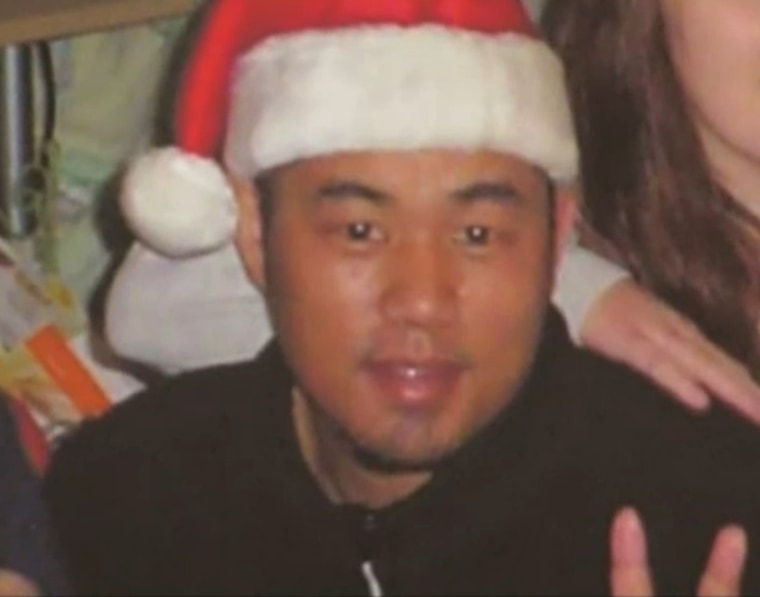A $2 million settlement has been reached in the 2015 fatal police shooting of a California man whose family said was mentally disabled and alleged in a lawsuit that one of the officers fired his gun eight times though he and his partner were not in danger.
Attorneys for the family of Mharloun Saycon announced the agreement on Wednesday, saying in a news release that the Long Beach City Council approved the $2 million payment during a closed session meeting on Dec. 5.
“Hopefully the settlement is something that sends a message that it is going to cost the city money to have lawless police officers on the streets,” Saycon family attorney Dan Stormer said in a phone interview.

Howard Russell, deputy city attorney for the Long Beach City Attorney's Office, said they believe the officers acted reasonably and lawfully.
“Whenever anyone chooses to settle, it’s because there is a chance of a greater financial liability if there's an adverse verdict," he said.
Russell said both officers are still with the Long Beach Police Department.
The city did not admit liability or wrongdoing in the settlement, according to a copy provided by Stormer.
Police shot and killed Saycon, an immigrant from the Philippines, on Dec. 14, 2015, after responding to a 911 call of a man with a knife inside a casino arcade.
Saycon, 39, had been in the Looff's Lite-A-Line Casino Game of Skill for around four and a half hours when a manager saw him scratching the surface of a game table with a pocket knife, the lawsuit alleged.
The manager asked Saycon to put away the knife, which he did, but later Saycon walked over to a patron he knew, began chatting, and showed off the knife to him, according to the suit. Saycon, who the lawsuit asserted was diagnosed with paranoid schizophrenia in his early 20s, did not point the pocket knife at the customer, nor did the customer feel threatened, the court filing alleged.
Several other patrons noticed the knife and alerted a manager, one of whom tried escorting Saycon from the arcade, the lawsuit said. But Saycon stopped at the exit, prompting another manager to phone the police, according to the court filing.
A news release from Saycon family attorneys said that staff made it clear in the 911 call that Saycon wasn’t threatening anyone and that they only needed help leading him off the premises. The lawsuit maintained that the responding officers were also made aware of Saycon’s mental disability.
The night of the shooting, the officers arrived as Saycon sat in a chair with a closed pocket knife in his lap and watched television, the lawsuit asserted.
They shouted at Saycon to drop the knife, the lawsuit alleged.
“When Mharloun did not immediately respond, the officers tased him, and then one of the officers lunged at Mharloun and beat him in the head with a baton,” the suit asserted.
Seconds later, one of the officers fired eight times from nearly 15 feet away, hitting Saycon in the chest, arm and abdomen, according to the lawsuit and news release. He died at the scene.
In a statement released a day after the shooting, the Long Beach Police Department said the responding officers received an update while en route that Saycon was in fact waving a knife inside the arcade and that some customers had left because they feared for their safety.
When officers arrived, they came upon Saycon who was sitting and still armed, police said. Saycon, according to the police statement, did not drop the knife when ordered to do so. Officers subsequently used an "electronic control device" and a baton on Saycon, which police said were both ineffective.
Following the shooting, officers immediately began life-saving measures on Saycon, police said.
Court papers responding to the Saycon family’s lawsuit against the City of Long Beach and the two officers argued that reasonable force was used and that the officers’ actions were lawful and justified.
“Mharloun Saycon was shot in the immediate defense of life following his refusal to submit to several lesser uses of force,” reads a 2017 court filing from the Long Beach city attorney and lawyers representing the officer who fired the shots. “There is no relevant evidence regarding Mharloun Saycon's mental health, as there is no competent evidence that this was ever known to the defendant officers.”
Khanly Saycon, Mharloun Saycon’s father, said in a statement that all they want is their son, who he said deserved to live.
“While nothing can bring him back to us, if this case saves even just one life by holding the police more accountable for how they treat people with mental illness, that’s the most I can hope for,” Khanly Saycon said.
Follow NBC Asian America on Facebook, Twitter, Instagram and Tumblr.